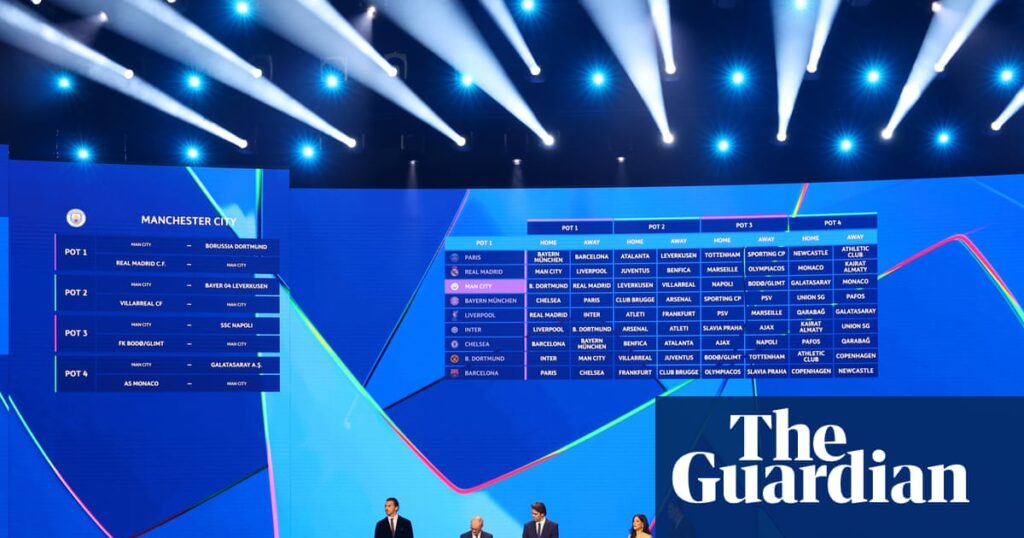Liverpool v Real Madrid! Arsenal v Bayern! Chelsea v Napoli! Madrid v Manchester City! Bayern v Chelsea! Newcastle v Barcelona! Inter v Liverpool! PSG v Bayern! City v Napoli! Madrid v Juventus! Chelsea v Barcelona! It can’t be denied that the Champions League draw threw up some ties that look like massive games.
These are games that have massive teams in them. They are happening in a massive competition. There will be famous players in famous kits in famous stadiums. There will be Champions League branding. They will play the Champions League theme tune. They will use the Champions League ball, taking its cues this season from the night sky and featuring hand-drawn zodiac signs in gold that symbolise heroic deeds and heavenly destiny. It will all look like something really important.
On 28 January there will be a massive, barely comprehensible night of 18 simultaneous games, games in which last season, as Giorgio Marchetti, Uefa’s excitable deputy general secretary, breathlessly reported: “Almost every team changed their position on the table at least once.”
And amid the blur of goals and flashing as-it-stands tables, perhaps nobody will realise that nothing that has gone before really matters all that much, that we have played 144 games to get a predictable last 24. Only then does the real business begin.
There was a surprising amount of positivity about the revamped Champions League last season, much of it emanating from Uefa, whose representatives spent the draw ceremony announcing once again that everything had been a tremendous success – although without offering any data to support that assertion, such as, say, viewing figures.
They did mention a record high for goals-per-game, but that will happen when you have teams as defensively hapless as RB Salzburg, Slovan Bratislava and Young Boys.
Before the draw, and before another excruciating video – was recording that why Aleksander Ceferin couldn’t manage to attend more than two games at the women’s Euros? – Uefa showed a clip of their video from last year explaining the new format, which featured Zlatan Ibrahimovic promising “more football” and “more jeopardy”. On the former count, Uefa delivered; on the latter, rather less so.
Liverpool beating Real Madrid and Arsenal beating Paris Saint-Germain, in the moment, felt like significant events; it was only later it became apparent how misleading, how irrelevant, those games were.
Perhaps football these days really is just about the absorption of content and fans will continue to lap up clashes between big sides, however meaningless – or perhaps there will be a reaction.
Clubs too may conclude that there’s no real need to go hard in every game. It may be nice to finish in the top eight – although it’s telling that the main reward is to be spared the burden of playing in two further games – but it’s far from essential.
It may even be worth a genuine contender fielding a second string against a fellow elite club rather than give them a rehearsal for a potentially far more significant game later in the competition. This is the problem when football just becomes about the production of content, none of which means very much.
There is some intrigue. Chelsea will play Napoli, Benfica, Barcelona and Bayern Munich, all of their opponents from the knockout stage in 2011-12 when they won the Champions League for the first time. Trent Alexander-Arnold might return to Anfield as Liverpool host Real Madrid, a repeat of no fewer than three European Cup/Champions League finals. Madrid, in fact, will face five former champions.
Arsenal have home games against Bayern and Atlético, but a draw kind enough to be targeting top eight and a couple of midweeks off in February.
Tottenham also can think the computer randomiser was generous. They face the champions, PSG, away, but proved in the Super Cup they can live with them, and also return to Bodø/Glimt whom they beat over two legs in the Europa League semi-final last season.
Newcastle can reprise one of their most famous Champions League nights as they face Barcelona at home, and also take on PSG at the Parc des Princes where they were involved a controversial draw two seasons ago. PSG, in fact, look to have a relatively tough test, all their opponents coming from Germany, Spain, Italy, England and Portugal.
But fundamentally the big teams will get through: five wins and a draw will probably secure top eight, or three wins and two draws for a spot in the playoffs. The odd team from outside the elite might make the playoffs and everybody will talk about the opportunities the new format affords, and by the last 16 we’ll be back to the usual suspects from the familiar western European leagues, Uefa will declare it all a massive success.
Then we’ll get a game like last season’s remarkable Inter v Barcelona clash in the semi-final, and all the nonsense that preceded it will be forgotten.


